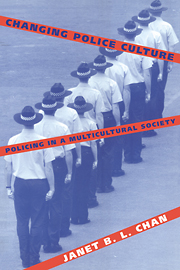Book contents
- Frontmatter
- Contents
- List of Figures
- List of Tables
- Acknowledgements
- Abbreviations
- Introduction
- 1 Policing in a Multicultural Society
- 2 Discrimination and Police Work
- 3 Strategies for Change
- 4 Re-examining Police Culture
- 5 Police and Minorities in New South Wales
- 6 Under New Management
- 7 Ethnic Affairs Policy Statement: The Paper Chase
- 8 Cop It Sweet: Reform by Media
- 9 Processes and Outcomes of Change
- 10 Changing Police Culture
- Bibliography of Works Cited
- Index
2 - Discrimination and Police Work
Published online by Cambridge University Press: 04 November 2009
- Frontmatter
- Contents
- List of Figures
- List of Tables
- Acknowledgements
- Abbreviations
- Introduction
- 1 Policing in a Multicultural Society
- 2 Discrimination and Police Work
- 3 Strategies for Change
- 4 Re-examining Police Culture
- 5 Police and Minorities in New South Wales
- 6 Under New Management
- 7 Ethnic Affairs Policy Statement: The Paper Chase
- 8 Cop It Sweet: Reform by Media
- 9 Processes and Outcomes of Change
- 10 Changing Police Culture
- Bibliography of Works Cited
- Index
Summary
The problem of police racism is subject to varying interpretations. While many people would find the descriptions in the last chapter alarming, others are just as likely to dismiss them as exaggerated or isolated incidents. Whether police racism is perceived as a problem largely depends on how the nature and function of police work are understood. One popular view often advanced by police officers themselves, for example, is that police work is predominantly reactive: police officers mostly react to situations as they arise and as they are called to attend, and so it can be argued that certain minority groups are ‘over-policed’ precisely because they cause more trouble or commit offences more frequently. Thus, police racism does not really exist, or it can easily be explained away, and hence nothing needs to be done about it. In direct opposition to this view, however, is a belief that police are acting as agents of an essentially racist or oppressive system that criminalises behaviours among the powerless, including visible minorities. Hence racism is not simply an occasional feature, but an institutionalised component, of police function. Moreover, there is no simple solution to the problem: it requires the empowerment of minorities in their struggle for self-determination against the existing structures of domination and criminalisation.
There are, of course, other perspectives which take a less critical view of the policing function, but nevertheless do not see policing as strictly reacting to law-breaking activities. These explanations centre on the structural and cultural organisation of police work.
- Type
- Chapter
- Information
- Changing Police CulturePolicing in a Multicultural Society, pp. 28 - 48Publisher: Cambridge University PressPrint publication year: 1997



